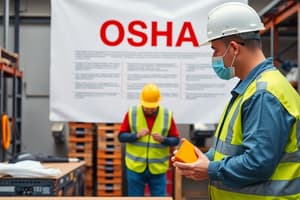Podcast
Questions and Answers
What is the purpose of OSHA?
What is the purpose of OSHA?
- To develop and maintain a formal plan to deal with workplace emergencies
- To communicate information about hazardous chemicals in the workplace to employees
- To establish labor standards, policies, and support programs promoting safe work environments
- To ensure workplace safety and health (correct)
What is the purpose of the Emergency Action Plan (EAP)?
What is the purpose of the Emergency Action Plan (EAP)?
- To disable and clearly mark unsafe equipment or machinery to prevent unexpected startup or operation
- To develop and maintain a formal plan to deal with workplace emergencies and communicate it to all employees (correct)
- To communicate information about hazardous chemicals in the workplace to employees
- To establish labor standards, policies, and support programs promoting safe work environments
What is the purpose of the Hazardous Material Communication Standard (HAZMAT)?
What is the purpose of the Hazardous Material Communication Standard (HAZMAT)?
- To disable and clearly mark unsafe equipment or machinery to prevent unexpected startup or operation
- To communicate information about hazardous chemicals in the workplace to employees and maintain Material Safety Data Sheets (MSDS) (correct)
- To establish labor standards, policies, and support programs promoting safe work environments
- To develop and maintain a formal plan to deal with workplace emergencies and communicate it to all employees
What is the Right-to-Know regulation?
What is the Right-to-Know regulation?
What is the Lockout/Tagout provision?
What is the Lockout/Tagout provision?
What is the purpose of the Personal Protective Equipment (PPE)?
What is the purpose of the Personal Protective Equipment (PPE)?
What is the responsibility of employers regarding hazardous materials?
What is the responsibility of employers regarding hazardous materials?
What are Musculoskeletal disorders (MSDs)?
What are Musculoskeletal disorders (MSDs)?
Which organization promotes workplace safety in Europe?
Which organization promotes workplace safety in Europe?
What does the International Labor Organization (ILO) do?
What does the International Labor Organization (ILO) do?
What does the Emergency Action Plan (EAP) require employers to do?
What does the Emergency Action Plan (EAP) require employers to do?
What does the Right-to-Know regulation require employers to do?
What does the Right-to-Know regulation require employers to do?
When is Personal Protective Equipment (PPE) required?
When is Personal Protective Equipment (PPE) required?
What does the Lockout/Tagout provision require employers to do?
What does the Lockout/Tagout provision require employers to do?
What are Musculoskeletal disorders (MSDs)?
What are Musculoskeletal disorders (MSDs)?
What is the purpose of OSHA's mandatory record-keeping system?
What is the purpose of OSHA's mandatory record-keeping system?
Flashcards are hidden until you start studying
Study Notes
Workplace Safety Regulations and Responsibilities
-
The Occupational Safety and Health Act of 1970 established three federal agencies: OSHA, NIOSH, and OSHRC to improve workplace safety in the United States.
-
OSHA is the federal safety organization that automotive service industry workers will work with regularly.
-
Canada has the Canadian Centre for Occupational Health and Safety (CCOHS), and Europe has the European Agency for Safety and Health at Work (EASHW) to promote workplace safety.
-
The International Labor Organization (ILO) works with governments, employers, and workers in 187 member states to set labor standards, policies, and support programs promoting safe work environments.
-
OSHA has shifted its focus from enforcement to education, advising, and guidance, though it still enforces serious violations and unsafe work conditions.
-
The Emergency Action Plan (EAP) requires employers to develop and maintain a formal plan to deal with workplace emergencies and communicate it to all employees.
-
The Hazardous Material Communication Standard (HAZMAT) requires employers to communicate information about hazardous chemicals in the workplace to employees and maintain Material Safety Data Sheets (MSDS).
-
The Right-to-Know regulation requires employers to inform employees of their exposure to hazardous chemicals and provide protection for them.
-
Employers are responsible for hazardous materials from cradle to grave, and cannot sell off that responsibility to waste haulers.
-
Personal Protective Equipment (PPE) is required when there is no reasonable method to make changes to the work environment to protect individuals.
-
The Lockout/Tagout provision requires employers to disable and clearly mark unsafe equipment or machinery to prevent unexpected startup or operation.
-
Vehicles left in a partial state of repair should be clearly marked to warn everyone of the potential danger.Workplace Safety: OSHA Guidelines and Preventive Action
-
OSHA is a federal agency responsible for ensuring workplace safety and health.
-
OSHA sets and enforces safety standards and guidelines for various industries.
-
Employers must comply with OSHA standards and guidelines to ensure workplace safety.
-
Employers must provide mandatory safety training to all employees on known hazards and how to control them.
-
Musculoskeletal disorders (MSDs) are chronic physical conditions or injuries brought on by specific job duties and can result in permanent disability.
-
MSDs can be prevented by using ergonomically designed tools, chairs, and workstations.
-
Employers must take reasonable care to minimize risks to employees and the company.
-
Failure to comply with safety regulations could result in negligence of safety regulations on the part of the employer.
-
Employers must communicate regularly with employees about safety hazards and how to control them.
-
Employees must be trained and authorized to perform their job duties safely.
-
Employees must know how to control hazards and respond to unsafe or dangerous situations.
-
Failure to comply with OSHA safety regulations can result in swift and severe consequences.
Studying That Suits You
Use AI to generate personalized quizzes and flashcards to suit your learning preferences.




